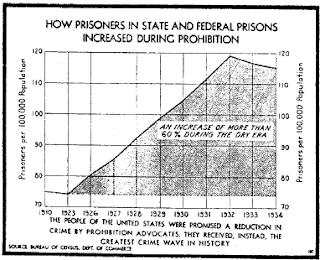 |
| Prisoners who violated nobody's rights |
SEC. 13. It shall be the duty of every carrier to make a record at the place of shipment of the receipt of any liquor transported, and he shall deliver liquor only to persons who present to the carrier a verified copy of a permit to purchase which shall be made a part of the carrier’s permanent record at the office from which delivery is made.
The agent of the common carrier is hereby authorized to administer the oath to the consignee in verification of the copy of the permit presented, who, if not personally known to the agent, shall be identified before the delivery of the liquor to him. The name and address of the person identifying the consignee shall be included in the record.
SEC. 14. It shall be unlawful for a person to use or induce any carrier, or any agent or employee thereof, to carry or ship any package or receptacle containing liquor without notifying the carrier of the true nature and character of the shipment. No carrier shall transport nor shall any person receive liquor from a carrier unless there appears on the outside of the package containing such liquor the following information:
Name and address of the consignor or seller, name and address of consignee, kind and quantity of liquor contained therein, and number of the permit to purchase or ship the same, together with the name and address of the person using the permit.
* * *
The
meaning of the term "duty" is
the moral necessity to perform certain actions for no reason other than obedience to some higher authority, without regard to any personal goal, motive, desire or interest.(
link)
When men with guns require you to buy a permit to purchase something,
that is the antithesis of free, uncoerced exchange of values by mutual consent. Observe that States which adopt this practice do not send openly armed uniformed officers to make the necessary threats of violence and collect the fees. Instead, these agents tend do be "plainclothes," that is,
disguised in the manner of secret police employed by totalitarian régimes. Depredation via this sort of mimesis also uses ordinary citizens as human shields. This--like the National Socialist practice of mass-killing civilians in retaliation for resistance--makes it difficult to neutralize the violence of this sort of "law."(
link)
When a monopoly on the use of force shirks the protection of individual rights to instead extort cash and obedience from service providers, freedom is destroyed. The law of supply and demand relies on the willingness of persons to participate in transactions which increase the wealth of nations. The result is impoverishment, as demonstrated when the Comstock Laws of 1873 turned the Postal Monopoly into an agent of book-burning superstition, censorship, fines and imprisonment.(
link) The Panic which followed is what they called sudden mass impoverishment before Crash and Depression became the fashionable Newspeak. Prohibition laws had this same effect in 1907, 1920 and 1929-33.
The expression "It shall be unlawful" is, when applied to production and trade, a promise to send armed brutes to kill as many people as necessary to instill terror in the survivors and obtain their obedience. No such thing is ever needed to enforce legitimate laws against such actual crimes as murder, robbery and looting. Is it any wonder that the U.S. economy crashed promptly when the Volstead law became enforceable, then again when "increased penalties" were added in 1929?
Get the complete story in Prohibition and The Crash on Amazon Kindle in two languages. After this you’ll be able to explain to economists exactly how fanaticism and loss of freedom wrecked the U.S. economy.

Prohibition and The Crash, on Amazon Kindle
Brazilian Sci-fi from 1926 featuring the usual beautiful daughter of a scientist touting prohibition and racial collectivism in America’s Black President 2228 by Monteiro Lobato, translated by J Henry Phillips (link)

I also produce books and articles in Portuguese, using Brazilian historical sources at http://www.expatriotas.blogspot.com or amigra.us







Comments
Post a Comment